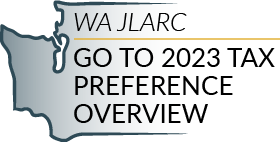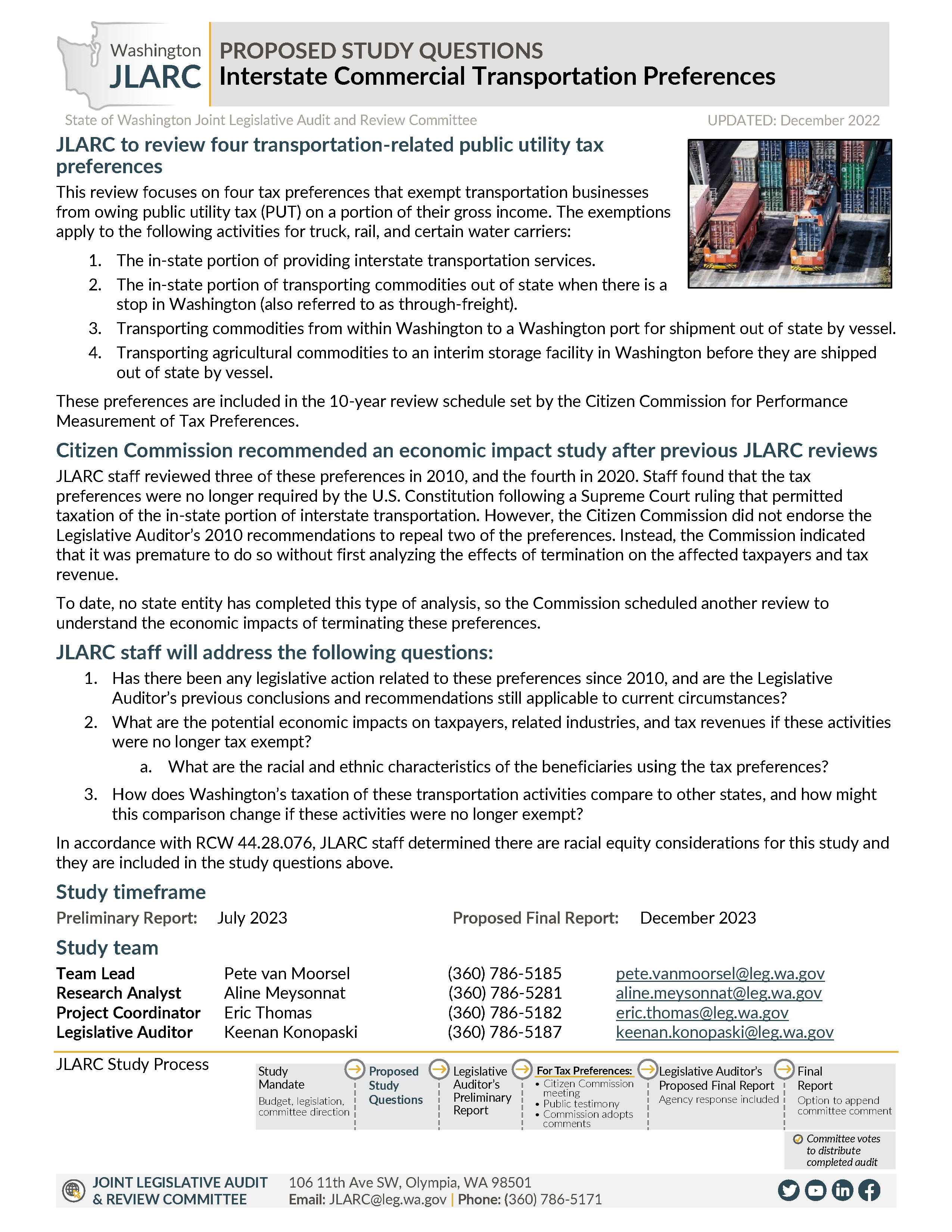Executive Summary
Four preferences reduce the amount of Public Utility Tax (PUT) paid by commercial transportation providers
Estimated Biennial Beneficiary Savings $219.8 million (2027-29 biennium) |
|
Commercial transportation that takes place entirely within Washington is generally subject to public utility tax (PUT). The four tax preferences in this review exempt earnings from transportation that occurs inside Washington if the transported goods will move across state or international lines. Specifically, the exemptions apply to earnings from:
- The in-state portion of interstate transportation.
- Interstate shipments of goods that stop in Washington for storage, manufacturing, or processing before they are transported to a final destination (through-freight).
- Transporting Washington commodities directly to a Washington port for export by vessel.
- Transporting Washington agricultural products to an interim storage facility before shipment to a Washington port for export by vessel.
The preferences do not have an expiration date.
Citizen Commission requested economic analysis
The first three preferences were enacted in the 1930s. JLARC staff inferred the objective was to comply with the Commerce Clause of the U.S. Constitution. Based on subsequent Supreme Court decisions, JLARC's 2010 review of the preferences determined that they were no longer needed for constitutional compliance.
The Legislative Auditor recommended repealing two of the preferences. The Citizen Commission for the Performance Measurement of Tax Preferences (Commission) did not endorse this recommendation, noting that affected taxpayers had structured their business activities on the assumption that the preferences would exist and that termination could have unintended negative consequences. The Commission called for an economic impact study of repeal.
The preferences make Washington’s commercial transportation industry more competitive
This report provides three analyses that illustrate different ways the preferences improve the competitiveness of Washington's transportation industry.
Preferences keep Washington taxes on interstate rail and truck transportation lower than average
The first analysis compares the estimated tax burdens for interstate rail and truck transportation in Washington and 10 other states. With the preferences, Washington has the lowest taxes for interstate rail transportation and the fourth lowest for interstate truck transportation (Section 4).

Source: Ernst & Young analysis.
Preferences reduce the cost of transporting freight through Washington, supporting increased freight volume at ports
The second analysis estimates the preferences' effect on the level of activity at ports. Stakeholders were concerned that repealing the preferences could increase the cost of transporting import and export freight through Washington. This could lead some businesses to divert shipments away from Washington ports to competitors in other states and Canada.
A consultant with expertise in supply chains and economic analysis of freight transportation estimated the trade diversion to other ports would be 0.16% of containerized imports, 0.5% of containerized exports, and 2.7% of grain exports (Section 4).
Preferences reduce transportation costs, supporting additional employment for the Washington transportation industry and its customers
If the Legislature repealed the preferences, transportation businesses would pay more public utility tax and general fund revenue would increase. JLARC staff used an economic model to estimate the economic impacts of these changes in two ways: 1) increased production costs for affected industries and 2) increased government spending. In general, the analysis suggests that the increased production costs lead to a loss of jobs, while increased government spending leads to an increase in jobs.
Transportation businesses might pass the increased costs to their customers. Two scenarios illustrate that the change in jobs and the affected industries depend on how much they pass on.
- In Scenario A, transportation businesses pass none of the increase to customers. There is a net loss of 785 private sector jobs, primarily in transportation, construction, manufacturing, and retail.
- In Scenario B, transportation businesses pass all of the increase to customers. There is a net loss of 860 private sector jobs, primarily in manufacturing, farming, transportation, retail, and forestry, fishing, and hunting (Section 5).
| Scenario A: Transportation businesses pass none (0%) of the tax cost to customers | Scenario B: Transportation businesses pass all (100%) of the tax cost to customers | |||||
|---|---|---|---|---|---|---|
| Sector | Job losses | Job gains | Net change | Job losses | Job gains | Net change |
| Private | -1,730 | 945 | -785 | -1,805 | 945 | -860 |
| Public | -180 | 925 | 745 | -165 | 925 | 760 |
| Total | -1,910 | 1,870 | -40 | -1,970 | 1,870 | -100 |
Source: JLARC staff analysis.
Recommendations
Legislative Auditor's Recommendation: Clarify
The Legislature should clarify the objectives for these preferences. They are no longer necessary to comply with the Constitution because the U.S. Supreme Court has changed its interpretation of the Commerce Clause. The Legislature may have other objectives for the preferences, though it has not stated them in law.
- If the Legislature has other objectives for these preferences, it should state those objectives and, if applicable, establish measurable criteria. Objectives for similar preferences include: to create and retain jobs, attract and retain businesses, and make Washington competitive with other states.
- If the Legislature's sole objective for the preferences is to avoid taxing any activity whose taxation is constitutionally prohibited, it should repeal the preferences because a fairly apportioned PUT would be constitutionally permitted. Such a policy change would require a method of apportioning transportation income to activities within the state.
You can find more information in Recommendations.
Commissioners' Recommendation
Endorse Legislative Auditor recommendation to clarify but the preference should be continued. The Legislature should retain these preferences but clarify the purpose and metrics to aid future reviews. All of the preferences benefit both large and small transportation companies that often operate with relatively low profit margins while still providing family wage jobs. The preferences for transporting Washington commodities directly to a Washington port for export by vessel and transporting Washington agricultural products to an interim storage facility before shipment to a Washington port for export by vessel support the use and viability of the state’s ports. Since Washington’s ports are a key part of the economy, and there is intense competition for port services on the West Coast, the elimination of these preferences could adversely impact port activity.
Committee Action to Distribute Report
On November 29, 2023 this report was approved for distribution by the Joint Legislative Audit and Review Committee.
Action to distribute this report does not imply the Committee agrees or disagrees with the Legislative Auditor recommendations.

















